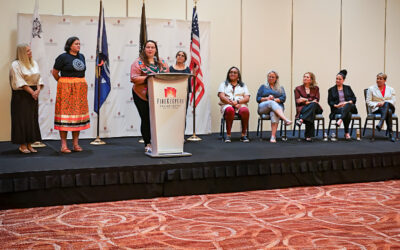The 25-member Social Services team at NHBP spends the majority of its time helping Tribal Members improve their health, families, lives and relationships so that they can be as healthy, happy and productive as possible, according to Social Services Director Meg Fairchild.
During March, which is celebrated as Social Work Awareness Month, we are taking a look at the role of social workers at NHBP and how they serve Tribal Members and their families.
“Mandated reporting, unfortunately, is what most people think of when they think of social workers, but at NHBP, the mandatory reporting work comprises only about a quarter of our actual caseload,” said Fairchild, who has worked for NHBP for more than 13 years. Having begun serving as the social worker for NHBP in 2008, Fairchild has seen tremendous growth over the years, requiring Social Services to split from Behavioral Health and then to become its own department, separate from the Health and Human Services Department.
In 2021, Social Services provided voluntary supportive services to:
- 27 NHBP vulnerable adults and/or Elders and their families
- 25 NHBP families that included 47 children
- 17 NHBP adults
- 9 NHBP guardianships
The premise of social work is based on the holistic approach: Focused not on a single issue or disease state, but rather, it looks at all the parts of the person and what they are dealing with. Social work also has different levels, ranging from the micro, at the individual and family level; to the mezzo, a community level; all the way to the macro, which would focus on large systems.
“The macro level of social work is where social justice and social equity lie,” Fairchild said. “As we often see in Native communities, there are historical traumas that need to be addressed at each of these levels. Also, with the trauma comes great resilience in Native communities, but facing that trauma and acknowledging it for what it is at each level can help mitigate its negative impacts.”
Skill-building is an important principle for NHBP Social Services, around which they have designed several programs, including the popular Curious Caregivers series. This monthly educational session focuses on parenting skills and features a new topic each month. Originally designed just for Tribal Members, it has gone virtual since the pandemic, increasing capacity to include all Members of federally recognized Tribes, as well as NHBP employees.
Also extending beyond the Tribe, the Social Services team offers training to the community on topics such as historical trauma and Adverse Childhood Experiences, which addresses the neurobiology, epigenetics, traumas and resilience-building for individuals and communities. Team members have long partnered with local child care centers, bringing well-researched programming and training to these centers, many of which serve Tribal Members and their family members, helping to fill any gaps for programs or what families may need.
“Additionally, we help advocate for students and parents with school systems, on such issues as individual educational plans, behavioral issues and more,” Fairchild said.
The advocacy demonstrated by NHBP expands into the macro level. NHBP Social Services team’s connections with local communities have created avenues for working with the state of Michigan’s Health and Human Services Department, with NHBP providing historical context for the Indian Child Welfare Act and Michigan Indian Family Preservation Act to other social workers, attorneys, court staff and agencies.
Fortunately, the team was prepared when the pandemic hit. Back in February 2020, the Social Services team had switched to a cloud-based electronic record system, enabling them to securely and appropriately access files from anywhere. Once the pandemic hit and NHBP team members were asked to stay home, “We never missed a beat and continued to provide services to families,” recalled Fairchild. “As soon as the courts were ready and back online, we were ready to do what needed to be done to help our families.”
Like other departments at NHBP, Social Services also has felt the pandemic’s impact: “We are dealing with more complex cases than ever. We encourage people to seek help before they hit a crisis point, to be proactive with issues so they can live their best lives.”
If you or a loved one needs the Social Services team, please connect by visiting: Social Services | NHBP (nhbp-nsn.gov).




0 Comments